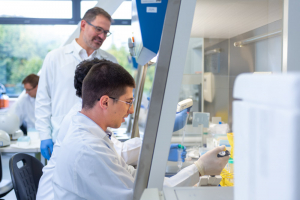ICRC concludes its MAGNET project on ageing
The project entitled “Unveiling the molecular determinants of aging to design new therapeutics (MAGNET)” has now successfully concluded at the International Clinical Research Center (ICRC) in Brno. Its main focus was research of selected ageing-associated diseases, understanding their mechanisms and finding potential targets for their treatment. The project, which gained great support from the European funds, attracted to Brno a number of both junior and established researchers, headed by Dr. Manlio Vinciguerra.
The main research objectives of the project consisted in unveiling the role of epigenetics, mechanosensors, immune response, intracellular transport, and mitochondrial dysfunction in the pathogenesis of aging-associated diseases. The specific problems targeted by the research activities were liver diseases such as hepatocellular carcinoma, innate immunity defects, cardiovascular and neurodegenerative pathologies.
The project was awarded over 177,5 mil. CZK in 2016 by the Ministry for Education, Youth and Sports of the Czech Republic (MŠMT). Funded through the Operational programme Research, Development and Education (in Czech OP VVV), it aimed at attracting a renowned international scientist, Dr. Manlio Vinciguerra, to establish his research group at the ICRC. At the time Dr. Vinciguerra was a Senior Scientist working at the University College London (UCL), London United Kingdom.
“The funding from the MŠMT through the OP VVV program helped us to significantly advance the understanding of aging-associated pathologies, which represent a true burden to the society” says Manlio Vinciguerra, the coordinator of the project. “It gave me the chance to join a very vibrant scientific environment at the ICRC and to establish my research group. I am extremely thankful for this opportunity” he continues.
The team employed other Principal Investigators of the ICRC, i.e. Irena Koutná, Giancarlo Forte, Gorazd Bernard Stokin, Jan Frič and Jaeyoung Shin; and attracted promising young researchers and students of more than 10 nationalities. Thanks to the available funds, we were also able to send our Ph.D. students for internships abroad.
“The international nature of the research team created thanks to the OP VVV funding was really a game changer. It created a lively and varied environment which helped the cross-contamination of scientific ideas. The result of this process has been excellent science.” comments Giancarlo Forte, who is also the Head of the Center for Translational Medicine at the ICRC, where the research was performed.
Focused on excellent and clinically meaningful research, the project led to disclose the role of histone protein macroH2A1 as a determinant of liver disease progression and of hepatocellular carcinoma aggressiveness, making it a potential target for future treatments. Moreover, the project allowed for the identification of novel predictive markers for heart failure, the proteins Yes Associate Protein (YAP) and heterogeneous nuclear ribonucleoprotein C (hnRNPC), together with providing the first multiscale map of the human failing heart. Additionally, thanks to the financial support of MAGNET project, scientists at the ICRC described how chronic inflammatory signalling affec t the extracellular matrix and also the phenotype of immune cells.
t the extracellular matrix and also the phenotype of immune cells.
“A number of young and established researchers participated in this very successful project. It was an honour for our institution to host it. The scientific objectives reached are truly remarkable” stress Prof. Irena Rektorová, the Head of ICRC.
These results were published in prestigious peer-reviewed international journals, like Hepatology, Science Translational Medicine, Nature Communications, Circulation Research, EMBO Molecular Medicine, Theranostics, iScience, GeroScience, Lancet Health Longevity, Acta Neuropathologica Communications and others. In terms of numbers, there were more than 100 publications affiliated to the project, with 50 % of them in Q1 journals. First quartile representing the best journals according to series of metrics.
“The project entailed the use of tissues and cells harvested from patients hospitalised at the premises of St. Anne’s University Hospital Brno (FNUSA), so that the results have a concrete translational potential” says Ing. Vlastimil Vajdak, director of FNUSA hospital.
MAGNET project also helped to establish the Cell and Tissue Engineering Facility (CTEF) at the ICRC, a unit endowed with ISO 9001 certification (quality management system) and GMP manufacture permit which manufactures advanced therapy medicinal products (ATMPs) including cell therapy and tissue engineered products.
The funding also allowed establishing or consolidating prestigious international collaborations with UCL (UK), the European Institute for Systems Biology and Medicine (EISBM, France), the University of Barcelona (Spain), the University of Geneva (Switzerland), the University of Southern California (USA), the University of Porto (Portugal), the University of Perugia (Italy).
 Supported by the European Regional Development Fund – Project MAGNET
Supported by the European Regional Development Fund – Project MAGNET
(No. CZ.02.1.01/0.0/0.0/15_003/0000492).

